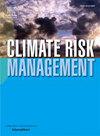加纳北部小农气候风险管理的性别、群体成员、交叉性和土著气候适应的决定因素
IF 5
2区 环境科学与生态学
Q1 ENVIRONMENTAL SCIENCES
引用次数: 0
摘要
本研究考察了性别与群体成员关系的交集,以及影响旱地社区男女小农为缓解气候风险、促进可持续粮食安全而采取土著适应策略的因素。它使用了来自加纳北部6个农村社区299个农户的12个焦点小组讨论的调查数据。采用描述性统计和二元logistic回归模型对住户数据进行分析。结果表明,小农的土着解决方案(如水土管理战略)存在性别差异。小农采用的最重要的本土适应策略包括使用有机肥料、雨水收集和精神咨询。从交叉的角度来看,群体成员是性别化的,有助于降低气候适应成本。有几个因素不同地塑造了男性和女性小农的本土适应策略。一般来说,年龄、教育程度和财富状况影响性别对气候变化的反应。具体而言,男性农民的本土策略受农场规模的显著影响,而女性农民的做法主要受农场经验、农场所有权和当地协会成员资格的影响。这些发现表明,社会、经济、人口和农业相关特征对于建设气候适应能力至关重要。研究结果为政策制定者和实践者制定性别敏感的适应计划、加强农业群体和增强适应能力提供了有见地的指导,最终在旱地土著社区促进有抵御力和可持续的粮食系统。本文章由计算机程序翻译,如有差异,请以英文原文为准。
Gender-group membership intersectionality and determinants of indigenous climate adaptation of smallholder farmers for climate risk management in northern Ghana
This study examined the intersection of gender and group membership as well as the factors influencing indigenous adaptation strategies of male and female smallholder farmers to moderate climate risks for sustainable food security in dryland communities. It used survey data from 299 farming households with 12 focus group discussions across six rural communities in northern Ghana. Household data were analyzed using descriptive statistics and a binary logistic regression model. The results reveal that smallholder farmers’ indigenous solutions, such as soil and water management strategies, are gender-differentiated. The most significant indigenous adaptation strategies employed by smallholder farmers include the use of organic manure, rainwater harvesting, and spiritual consultations. From an intersectional perspective, group membership is gendered and facilitates the reduction of climate adaptation costs. Several factors differently shape the indigenous adaptation strategies of male and female smallholder farmers. Generally, age, education, and wealth status influence gender responses to climate change. Specifically male farmers’ indigenous strategies are significantly affected by farm size, whereas female farmers’ practices are mainly shaped by farm experience, farm ownership, and membership in local associations. These findings indicate that social, economic, demographic, and farm-related characteristics are essential for building climate resilience. The findings offer insightful guidance for policymakers and practitioners to develop adaptation plans that are gender-responsive, strengthen farming groups, and enhance adaptive capacity, ultimately promoting resilient and sustainable food systems in dryland indigenous communities.
求助全文
通过发布文献求助,成功后即可免费获取论文全文。
去求助
来源期刊

Climate Risk Management
Earth and Planetary Sciences-Atmospheric Science
CiteScore
8.20
自引率
4.50%
发文量
76
审稿时长
30 weeks
期刊介绍:
Climate Risk Management publishes original scientific contributions, state-of-the-art reviews and reports of practical experience on the use of knowledge and information regarding the consequences of climate variability and climate change in decision and policy making on climate change responses from the near- to long-term.
The concept of climate risk management refers to activities and methods that are used by individuals, organizations, and institutions to facilitate climate-resilient decision-making. Its objective is to promote sustainable development by maximizing the beneficial impacts of climate change responses and minimizing negative impacts across the full spectrum of geographies and sectors that are potentially affected by the changing climate.
 求助内容:
求助内容: 应助结果提醒方式:
应助结果提醒方式:


